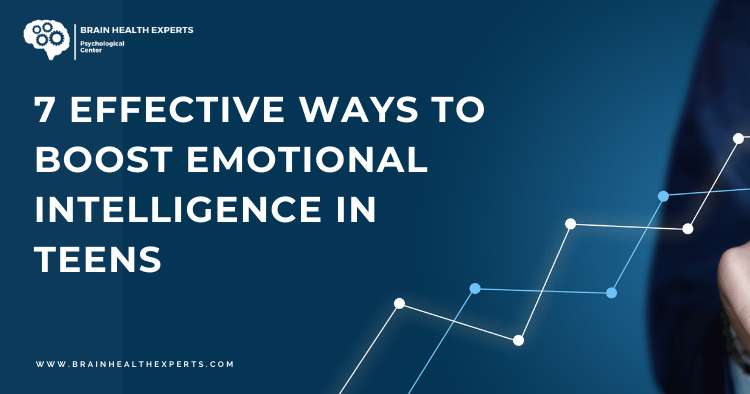Table of Contents
- Understanding Emotional Intelligence
- Encourage Open Communication
- Model Emotional Awareness
- Teach Empathy
- Promote Problem-Solving Skills
- Foster Healthy Relationships
- Support Mindfulness Practices
Understanding Emotional Intelligence
Emotional Intelligence (EI) is the ability to recognize, understand, manage, and influence emotions—both in ourselves and in others. For teens, developing EI is crucial as it helps them navigate the tumultuous waters of adolescence, which often includes peer pressure, identity crises, and heightened emotional experiences.
“Emotional intelligence is not just about understanding emotions; it’s about using that understanding to foster healthier relationships and personal growth.”
Recent research indicates that teens with higher emotional intelligence tend to have better relationships, improved academic performance, and greater overall well-being. A 2024 study published in the Journal of Educational Psychology confirms that emotional intelligence is a stronger predictor of success than IQ. This has prompted many educators and parents to focus on emotional intelligence as a key component of personal development. Read more about this study here.
Encourage Open Communication
Creating an environment that encourages open communication is fundamental in fostering emotional intelligence in teens. Encourage them to express their feelings and thoughts without fear of judgment. Here’s how to do it:
- Active Listening: Show genuine interest in what your teen has to say. Use techniques like nodding and summarizing their points to demonstrate you’re engaged.
- Non-Judgmental Attitude: Create a safe space for discussions. Avoid jumping to conclusions or offering unsolicited advice immediately. Instead, ask open-ended questions that prompt deeper reflections.
- Regular Check-Ins: Make it a habit to check in with your teen about their feelings and experiences. This can be during family dinners or casual outings.
“Open communication is the bedrock of trust. The more your teen feels heard, the more they will open up.”
For more on fostering positive communication techniques, refer to 10 Tips to Overcome Negative Thought Patterns Today.
Model Emotional Awareness
Teens learn a lot by observing the adults around them. To help your teen develop emotional intelligence, model emotional awareness in your own life:
- Express Your Own Emotions: Share your feelings in appropriate contexts. For example, if you’re feeling stressed, explain why and how you’re managing it.
- Discuss Emotional Scenarios: Use movies, books, or real-life situations to discuss characters’ emotions and choices. Ask questions like, “How do you think they felt in that moment?”
- Self-Regulation Techniques: Demonstrate how to manage emotions effectively. Techniques such as deep breathing, journaling, or even taking a break can be great examples for your teen to emulate.
“Modeling emotional awareness not only teaches your teen but also reinforces your own emotional skills.”
Teach Empathy
Empathy is a key component of emotional intelligence. Here are some strategies to help your teen cultivate this important skill:
- Role-Playing: Engage in role-playing scenarios where your teen has to consider another person’s perspective. This helps them practice empathy in a safe setting.
- Community Service: Encourage participation in community service projects. Experiences that involve helping others can provide teens with insight into the struggles and emotions of different individuals.
- Discuss Empathetic Responses: When discussing stories or news, ask your teen how they think others might feel and what responses would be appropriate.
“Empathy is the bridge that connects us to others. Teaching it can create a more compassionate world.”
Explore further on how empathy can enhance your teen’s emotional skills in 10 Ways Emotional Intelligence Boosts Your Relationships.
Promote Problem-Solving Skills
Emotional intelligence involves not just understanding emotions but also effectively managing them. Teaching problem-solving skills equips teens to handle emotional challenges better:
- Brainstorming Sessions: When your teen faces a problem, sit down together and brainstorm possible solutions. Encourage them to think through the consequences of each option.
- Decision-Making Exercises: Provide scenarios where your teen has to make decisions based on emotional information. Discuss the outcomes and what could have been done differently.
- Reflective Journaling: Encourage your teen to keep a journal where they can reflect on emotional challenges they encounter and how they addressed them.
“Problem-solving is not just about finding solutions; it’s about understanding the emotions involved in the situation.”
Foster Healthy Relationships
Healthy relationships are vital for emotional development. Help your teen build and maintain these connections:
- Encourage Friendships: Support your teen in forming friendships and spending time with peers who contribute positively to their emotional health.
- Teach Conflict Resolution: Provide tools for resolving conflicts, such as using “I” statements or seeking compromise.
- Set Boundaries: Discuss the importance of setting healthy boundaries in relationships. Help them understand that it’s okay to say no and prioritize their emotional well-being.
“Healthy relationships are the garden where emotional intelligence can blossom.”
For insights on strengthening relationships through emotional intelligence, check out 10 Ways Positive Thinking Transforms Your Relationships.
Support Mindfulness Practices
Mindfulness practices can significantly enhance emotional intelligence by improving self-awareness and emotional regulation:
- Mindfulness Meditation: Introduce short mindfulness meditation sessions. Apps like Headspace or Calm can be helpful in guiding these practices.
- Breathing Exercises: Teach your teen simple breathing techniques to help them manage stress and emotional upheaval.
- Nature Walks: Encourage regular outdoor activities. Nature has a calming effect and can help teens connect with their emotions in a peaceful environment.
“Mindfulness is the pause that allows us to respond thoughtfully rather than react impulsively.”
Discover more mindfulness techniques in 7 Effective Exercises to Reduce Stress and Boost Wellbeing.
FAQs About Emotional Intelligence in Teens
Q: Why is emotional intelligence important for teens?
A: Emotional intelligence is vital for teens as it helps them manage stress, build healthy relationships, and improve academic performance. It prepares them for adult responsibilities by enhancing their social skills and emotional regulation.
Q: Can emotional intelligence be taught?
A: Yes, emotional intelligence can be cultivated through practice and guidance. Parents, educators, and mentors can play a significant role in developing these skills.
Q: How can I tell if my teen has high emotional intelligence?
A: Signs of high emotional intelligence in teens include effective communication, empathy toward others, good conflict resolution skills, and the ability to manage their emotions.
By implementing these seven effective strategies, you can help your teen not only boost their emotional intelligence but also equip them with essential life skills that will serve them well into adulthood. Remember, fostering emotional intelligence is a journey, and every small step counts!
For more resources on emotional intelligence, check out the Collaborative for Academic, Social, and Emotional Learning (CASEL), a leading organization in promoting social and emotional learning. Also, consider exploring Top 10 Must-Read Books on Emotional Intelligence – 2024 for additional insights.





